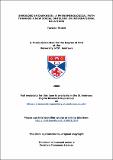Files in this item
Shrouded in darkness : a phenomenological path towards a new social ontology in international relations
Item metadata
| dc.contributor.advisor | Rengger, N. J. (Nicholas J.) | |
| dc.contributor.author | Michel, Torsten | |
| dc.coverage.spatial | 342 | en |
| dc.date.accessioned | 2008-11-20T14:29:13Z | |
| dc.date.available | 2008-11-20T14:29:13Z | |
| dc.date.issued | 2008-11-27 | |
| dc.identifier.uri | https://hdl.handle.net/10023/556 | |
| dc.description.abstract | The thesis sets out to critique recent accounts dealing with the notion and role of ontology in IR theorising as it can be found, for instance, in Alexander Wendt and more recently in the writings of critical realists. The main aim of these treatises on ontology is to provide a new perspective for IR theory that is in line with a more general critique of epistemological foundationalism and strict empiricism. Thereby these accounts rely upon an interpretation of scientific realism as it can be found in the Philosophy of Science. The thesis shows how these approaches to ontology on the one hand overcome epistemological foundationalism but, on the other hand, reaffirm a form of ontological foundationalism through the apodictic positing of ‘intransitive objects’ that exist outside and independent of the human mind. Such an approach, rather than leading to a new and better conception of ontology, reifies the same biases of Cartesian subjectivity, the designative nature of language, a correspondence theory of truth and the problem-laden concept of freedom as it was conceived in Kant’s third antinomy. In response to these approaches whose general aim at reconceptualising ontology must be welcomed, the thesis develops a new approach that does not recreate the same problems in a different fashion but tries to overcome them through a reconceptualisation of the term ontology itself. The basis for the thesis is to be found in post-Husserlian phenomenology, a body of literature that has so far been widely ignored in IR theorising. By explicating the main tenets in the thought of such eminent philosophers as Heidegger, Gadamer, Merleau-Ponty and Ricoeur the thesis reconstructs the notion of ontology on the basis of an enquiry into the meaning of being in general and human being in particular. From this perspective a new approach to the notions of agency, language, truth and freedom becomes possible without recreating the rifts and foundationalisms that characterises many approaches to social and political relations. | en |
| dc.format.extent | 1616735 bytes | |
| dc.format.mimetype | application/pdf | |
| dc.language.iso | en | en |
| dc.publisher | University of St Andrews | |
| dc.rights | Creative Commons Attribution-NonCommercial-NoDerivs 3.0 Unported | |
| dc.rights.uri | http://creativecommons.org/licenses/by-nc-nd/3.0/ | |
| dc.subject | Ontology | en |
| dc.subject | IR theory | en |
| dc.subject | Critical realism | en |
| dc.title | Shrouded in darkness : a phenomenological path towards a new social ontology in international relations | en |
| dc.type | Thesis | en |
| dc.type.qualificationlevel | Doctoral | en |
| dc.type.qualificationname | PhD Doctor of Philosophy | en |
| dc.publisher.institution | The University of St Andrews | en |
This item appears in the following Collection(s)
Except where otherwise noted within the work, this item's licence for re-use is described as Creative Commons Attribution-NonCommercial-NoDerivs 3.0 Unported
Items in the St Andrews Research Repository are protected by copyright, with all rights reserved, unless otherwise indicated.


